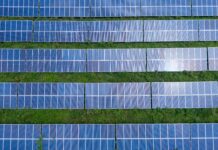Doug Young
Bottom line: New financing deals for Canadian Solar and Trina reflect the growing role of solar panel makers as power plant builders, and could provide some stability to the sector by providing a more reliable stream of new projects.
Two big new financing deals are shining a spotlight on a major shift taking place in the solar panel sector, with manufacturers increasingly moving into the field of solar farm development. The shift is seeing solar panel makers become their own best customers, buying up panels for use in solar farms that they build themselves. The latest headlines have Canadian Solar (Nasdaq: CSIQ) and Trina (NYSE: TSL) securing major new financing for such construction, in 2 deals that are both quite large but also very different in nature.
Solar panel makers have been building their own plants for several years now, though the trend has accelerated in the last year. The traditional model was for them to build solar farms using their own panels, and then sell those plants to longer-term buyers. But in an interesting twist to that story, solar panel makers may be looking to hold those farms themselves and put them into separate units, my sources say. Those units could then be spun off later into separate publicly listed companies, in a play that would look like a new energy version of traditional power utilities.
Let’s begin with a round-up of the 2 newest financing deals, starting with one that has seen Canadian Solar just land a $100 million loan from Swiss banking giant Credit Suisse. (company announcement) No terms were given for the loan, though one of my sources told me the interest rates were quite high, reflecting the tenuous position of solar panel makers right now due to stiff competition in the oversupplied market.
Canadian Solar said the loan was meant as a short-term, two-year bridge facility to help finance its $265 million purchase announced earlier this year of Recurrent Energy, a builder of solar power plants. It added it could boost the facility by another $100 million. In a final interesting note, Canadian Solar said it will give Credit Suisse the option to convert the loan to its stock at a price of $24.48 per share. That represents a 14 percent premium over Canadian Solar’s latest closing price, and seems to indicate a certain degree of confidence in the stock by Credit Suisse.
Trina Ties With Citic
Next there’s the Trina deal, which involves a much larger 10 billion yuan ($1.6 billion) in financing from the several units of state-run financial services giant Citic. (company announcement) The financing is part of a 5-year series of agreements that will see Citic provide financing for a range of uses, including equipment upgrades and new plant construction.
The Trina deal looks a bit more political than Canadian Solar’s, since Citic is a major state-run financial conglomerate with strong ties to Beijing. But the deal does appear to show that Trina has Beijing’s support, and could emerge as one an important consolidator for a Chinese solar panel sector plagued by excess capacity. Citic’s state-run roots also indicate a big portion of the financing could be used for domestic solar plant construction, as China looks to lower its reliance on fossil fuels.
Both of these deals do seem to indicate that financiers are becoming increasingly comfortable with backing the stronger Chinese solar panel makers to do their own plant construction. That’s an important step forward, since most of these companies were traditionally just manufacturers, and relied on third parties to buy their panels for use in new plants.
This kind of plant construction also carries a certain degree of risk, since there’s always the possibility of delays or other unforeseen problems that could cause projects to get scrapped or produce yields lower than earlier forecasts. There’s also the risk that projects may not be able to find long-term buyers upon completion, though the panel makers could reduce that by creating their own separate units focused on plant construction. At the end of the day these 2 new financing deals both look relatively positive, and could mark the start of a new chapter in the development of China’s solar panel sector.
Doug Young has lived and worked in China for 15 years, much of that as a journalist for Reuters writing about Chinese companies. He currently lives in Shanghai where he teaches financial journalism at Fudan University. He writes daily on his blog, Young´s China Business Blog, commenting on the latest developments at Chinese companies listed in the US, China and Hong Kong. He is also author of a new book about the media in China, The Party Line: How The Media Dictates Public Opinion in Modern China.






